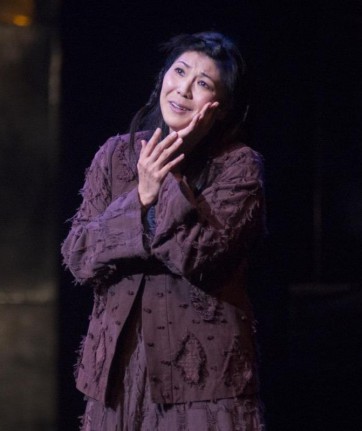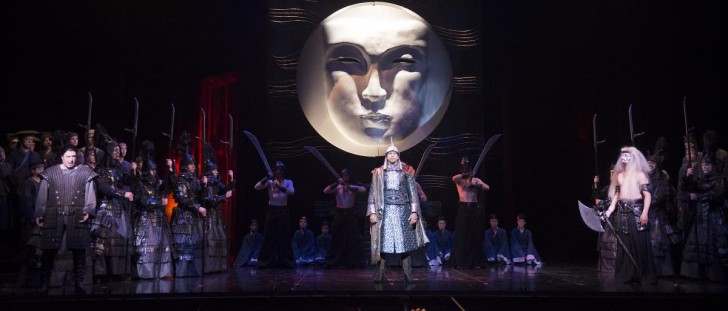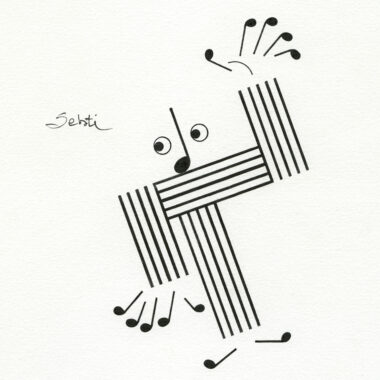Plus de détails
Montréal. Salle Wilfrid-Pelletier de la Place-des-Arts. 17-V-2014. Giacomo Puccini (1858-1924) : Turandot, opéra en trois actes sur un livret de Giuseppe Adami et Renato Simoni, terminé par Franco Alfano. Mise en scène et chorégraphie : Graeme Murphy ; Assistant : Kim Walker. Collaboratrice artistique : Janet Vernon. décors et costumes : Kristian Fredrikson ; éclairages : John Drummond Montgomery. Avec : Galina Shesterneva, Turandot ; Kamen Chanev, Calaf ; Hiromi Omura, Liù : Grigori Soloviov, Timur ; Jonathan Beyer, Ping ; Jean-Michel Richer, Pang ; Aaron Sheppard, Pong ; Guy Bélanger, Empereur Altoum ; Josh Whelan, Un Mandarin. Chef de chœur : Claude Webster. Chœur de l’Opéra de Montréal. Les Petits Chanteurs du Mont-Royal. Les Voix Boréales. Orchestre Métropolitain. Direction : Paul Nadler
 The Opéra de Montréal closed its 34th season with Puccini's unfinished opera Turandot.
The Opéra de Montréal closed its 34th season with Puccini's unfinished opera Turandot.
Graeme Murphy's production of Turandot, which originated in Australia twenty years
ago (and which is also available on DVD), remains as attractive as ever. This staging's
undeniably greatest asset is the absence of any dead spots, any moments when the visual
elements conflict with the ensemble's spatial patterns or when their movements appear
too studied or obviously choreographed—a powerful staging, galvanized by the
movements of the chorus, dancers, and a multitude of extras. John Drummond
Montgomery's lighting alternates between deep shadow and harsh, bright cues with great
skill, while Kristian Fredrikson's sets, costumes, and makeup, often sumptuous, transport
the audience to a timeless vision of the Middle Kingdom, a distant realm of myth,
eternally changeless and dominated by ritual. A very realistic moon, among many other
illusions, keeps the spectators on their toes throughout, as we are immersed in a strange
land where exoticism is entwined with eroticsm, and where a princess's cruel whims
inevitably end with the beheading of her suitors. Yet there is nothing vulgar or kitschy
here to weaken the text or evade its intrinsic structure. The first appearance of Turandot is
like the birth of an Asian Venus behind a fan that reveals her before immediately closing
again. However, Turandot's universe is first and foremost made of sound.
Among the women, the highlight was the Liù of Hiromi Omura, a Japanese soprano wellknown in Montreal for her performances in Madame Butterfly (a memorable Cio-Cio-
San), Simon Boccanegra (Amelia) and Il Trovatore (Leonora). Her voice was pure
delight in an intoxicatingly cool “Signore, ascolta.” She dominated the cast, revealing the
full range of her capacities. Her splendid singing, with its rich harmonics and exemplary
phrasing, became deeply touching as soon as she hit the first notes of “Tanto amore
segreto,” in a performance culminating in a superb rendition of “Tu che di gel sei cinta,”
sublimely sensitive, sincere, and full of character; a marvelous death aria fully equal to
the composer's final inspiration.
It is never an easy task to tackle the role of Turandot; she is always a complicated
character to play—and all the more here when, in her second appearance, she must stand
on a kind of stepladder on wheels, dressed in a long white robe, an inaccessible princess
who cannot move of her own volition but must rely on her servants to turn around, as if
caught in a trap of her own making. Galina Shesterneva has the vocal capacities that
make for a great Turandot. Her interpretation does not reduce the character to an icy
monster: we can sense the trembling flesh, the woman's heart that can be conquered. She
offers a fine-spun interpretation of unusual subtlety in “In questa regia.” The dramatic
dimension is always present, but the character develops perceptibly with each of her
appearances. Shesterneva was always physically credible onstage and projected with a
full and intense voice.

Among the men, Bulgarian tenor Kamen Chanev was something of a disappointment as
Calaf. At first, his voice appeared veiled. He looked awkward onstage, and his demands
for Turandot's love remained lukewarm at best. To be sure, his voice is robust, with solid
high notes, but it lacks ease or maybe simply natural affinity with Puccini's world.
Chanev spared no effort but met the role's demands at best partway. Still, his eagerly
awaited “Nessun dorma” roused the audience to an ovation even before the final notes
had ended.
The court officials, Ping (baritone Jonathan Beyer), Pang (tenor Jean-Michel Richer), and
Pong (tenor Aaron Sheppard) deserve a more than honorable mention: they had a nice
stage presence and formed a tightly knit trio, from their humorous first intervention in the
first act to their menacing abuse in the third. All three are clearly first and foremost men
of theater. Their voices complement one another and are fully up to the demands of the
score. The early part of the second act showcases the talents of each, with shimmering
upper ranges and a very fine blend.
Russian bass Grigori Soloviov has the voice and the looks needed to play the blind fallen
king. His tone was exemplary and his voice of remarkable heft. Emperor Altoum is a
perfect part for tenor Guy Bélanger, all the more in that it is so short.
The choir of the Opéra de Montréal under the direction of Claude Webster, the Petits
Chanteurs du Mont-Royal, and the Voix Boréales all did tremendous work. The
importance of the massive chorus is very clear in this staging: the battle-hardened hordes,
well directed, were cohesive and homogenous and lent depth to the work. Finally, the
Orchestre Métropolitain, under the baton of Paul Nadler, proved themselves equal to the
conductor's demands, and did full justice to Puccini's last opus..
Photos : Hiromi Omura (Liù) © Yves Renaud
Plus de détails
Montréal. Salle Wilfrid-Pelletier de la Place-des-Arts. 17-V-2014. Giacomo Puccini (1858-1924) : Turandot, opéra en trois actes sur un livret de Giuseppe Adami et Renato Simoni, terminé par Franco Alfano. Mise en scène et chorégraphie : Graeme Murphy ; Assistant : Kim Walker. Collaboratrice artistique : Janet Vernon. décors et costumes : Kristian Fredrikson ; éclairages : John Drummond Montgomery. Avec : Galina Shesterneva, Turandot ; Kamen Chanev, Calaf ; Hiromi Omura, Liù : Grigori Soloviov, Timur ; Jonathan Beyer, Ping ; Jean-Michel Richer, Pang ; Aaron Sheppard, Pong ; Guy Bélanger, Empereur Altoum ; Josh Whelan, Un Mandarin. Chef de chœur : Claude Webster. Chœur de l’Opéra de Montréal. Les Petits Chanteurs du Mont-Royal. Les Voix Boréales. Orchestre Métropolitain. Direction : Paul Nadler







